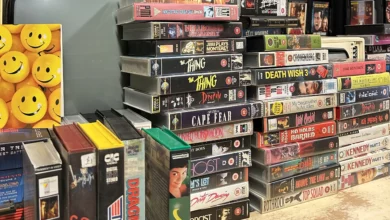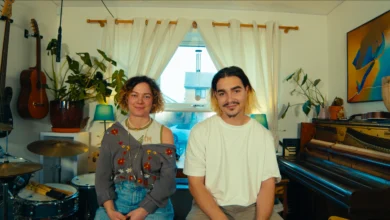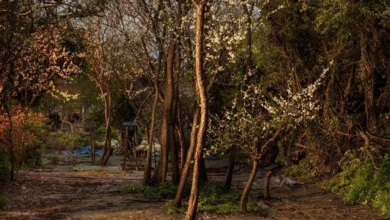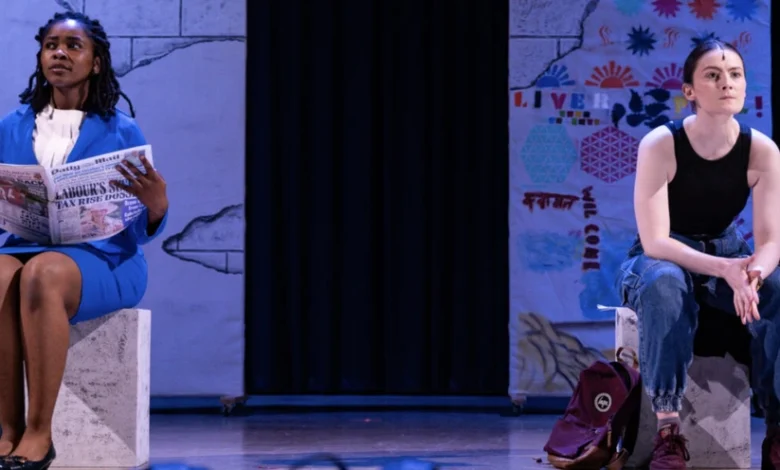
Theatre As Testimony: Afloat Amplifies Voices Often Left Unheard
Afloat is a powerful and urgent piece of theatre developed in collaboration with Asylum Link Merseyside and directed by Phoebe McSweeney.
Created through workshops with asylum seekers and support workers, the performance offers a poignant exploration of migration, political extremism, and human resilience. Set in a dystopian fictional city, the narrative follows the strained relationship between Angela, a right-wing political candidate, and Sam, a community worker supporting asylum seekers. As the Blue Party gains power and its harsh, authoritarian agenda unfolds, even its supporters are not spared from the fallout.
Blending traditional drama with physical theatre, and featuring a diverse ensemble cast, Afloat captures the emotional weight and complexity of life in the asylum system. With text rooted in real-life testimonies, the production highlights the limbo and isolation faced by those seeking safety, while ultimately offering a message of hope and shared humanity amidst growing fear and division. Liverpool Noise’s Steve Kinrade caught up with Writer and Director Phoebe McSweeney in order to gain a deeper understanding of the play’s creative process…
How did the collaborative workshop process with asylum seekers shape the development of the script and narrative of Afloat?
Phoebe McSweeny: A lot. The framework and structure of the script were written by Phoebe and Dora based on the concept of reversing the roles, having two British characters ending up having to flee their country and apply for asylum elsewhere. A lot of the cast’s lines are in verbatim theatre, where the script is created from the exact, unedited words spoken by them referring to real life experiences. Sometimes spoken by the cast, sometimes prerecorded. It was really important to both reflect personal experience but also not make it about one person’s experience and capture stories that people can relate to.
What inspired the choice to frame the story in a dystopian setting, and how does that heighten the impact of the themes explored?
PM: The reason the show is set in a dystopian setting is to allow English people to see themselves clearly in the shoes of someone seeking asylum by using current climate issues, politics and news in the UK. It gives the audience member a feeling that it could happen to them at any point and allows them to develop more empathy for individuals in the asylum process. The show however is based on true events and real life stories from members of asylum link.
Can you speak about the decision to make parts of the script verbatim? What did you hope to convey by using real voices and experiences?
PM: The verbatim piece of theatre allows members who may not be able to attend the live show the chance to have their voice heard and use it to frame the show.
Using real voices and experiences allows the audience to connect with the material on a deeper level and hear first hand experiences. It makes the story authentic, real and raw.
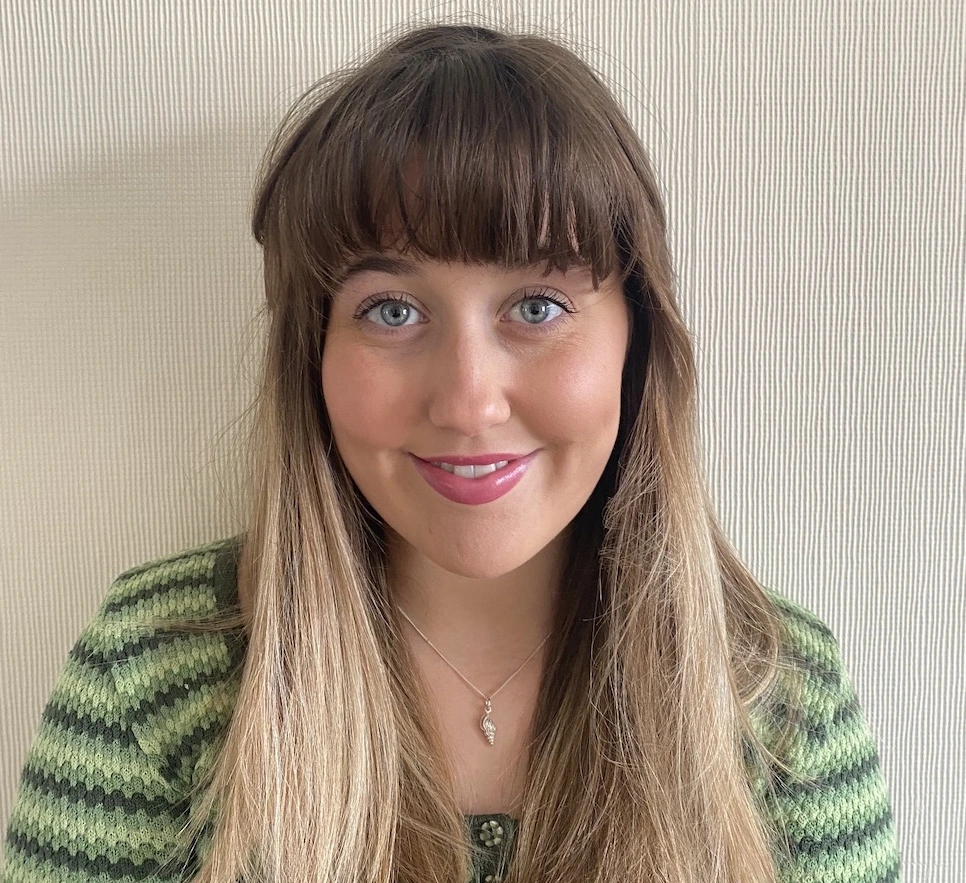
How did the contrasting characters of Angela and Sam come to represent the larger political and social dynamics at play?
PM: A superficial reading could simply see Angela portray the political right and Sam the left. But having them be human characters we are able to represent these social dynamics through subtle and nuanced traits that of course are far from black and white. We also see that situations, dynamics and characters can start looking one way but then end up another way and the concepts of good and evil become interchangeable and are constantly challenged.
How did you balance the deeply political and emotional content of the piece with moments of hope and humanity?
PM: To balance the show we have current trending situations in-bedded in the script and find ways of finding lighter moments such as Nigel Farage getting a milkshake thrown at him. We also found through the workshops that community is a huge part of belonging and humanity which is incredibly important for someone who is fleeing to safety. We wanted to highlight that even though people are going through horrendous situations they are still finding the light by reaching out to communities, learning a new skill and creating friendships.
What was the most challenging aspect of directing a piece with such sensitive and real-life material?
PM: The most challenging part of directing a piece of vulnerable theatre was finding the balance of what worked, what was educational but what also spoke to the audience. We worked with the same members for months prior to the show meaning trustful working relationships were built and members knew that doing a show about this would help them feel empowered but also help fellow friends who are also seeking asylum.
What roles does the music and movement play in the piece?
PM: We’ve been working with composer/musician George Jenkins on the music and sound design for the show, and with Director/movement practitioner Eli Randle to add movement in scenes through the show. These elements are a necessity to the piece as music and movement are two universal languages that don’t require words to make us feel a certain emotion. With a cast originating from all over the world, using sounds and visual cues gives everyone freedom to express themselves without the restraints of one language. Both of these art-forms are powerful tools that can not only elevate scenes and add layers but also develop understanding and empathy of real-life stories.
How has working in partnership with Asylum Link Merseyside influenced the authenticity and outreach of the production?
PM: Working with Asylum Link Merseyside has been amazing and a fundamental part of the project, we have met lots of different people along the way with different skill sets which has added to the show. It has also helped Afloat develop deeper connections with local organisations in Merseyside, which has led to other opportunities for the team and members of Afloat. We have recently partnered with the University of Liverpool to create a zine looking at the counter protests.
What kind of audience reactions have stood out to you, particularly from those with no prior understanding of the asylum process?
PM: Audience feedback was fantastic last year. A lot of people feel very impacted by the stories and report having benefited from hearing from people directly impacted. The two types of reactions that were the most valuable and moving were on one hand from people with lived experience of the asylum system feeling seen and heard. On the other hand we have had reports from audience members who’ve previously held negative views towards people in the asylum system who said this play had opened and widened their minds and left their opinions changed, which of course is fantastic.
What are your hopes for the future of Afloat as it continues to develop and potentially tour other venues?
PM: We are looking at creating a company under Afloat as we have a group of amazing artists who want to continue the ethos and work of the project. We are also wanting to tour the show to other places, potentially places that may not know much about the asylum process.
What do you hope each audience member walks away with after seeing Afloat? Is there a single feeling, question, or realisation you want to leave them with?
PM: There isn’t a single feeling as what they’re faced with is complex and will resonate with everyone differently. On one side we’ll have people who have a deep understanding of the asylum system for having experienced it, people who will hopefully feel heard, seen and represented or working or organising in the sector who will feel energised in their efforts and remember why they’re working in it. On the other end of the spectrum we hope to inspire people to think differently about people who seek asylum and question mainstream narratives.
Afloat
Friday 23rd and Saturday 24th May 2025.
Unity Theatre
Tickets
Phoebe was In Conversation with Steve Kinrade.




